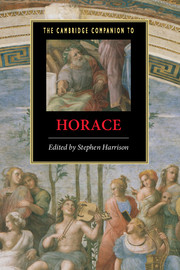Book contents
- Frontmatter
- Introduction
- Part 1: Orientations
- Part 2: Poetic Genres
- Part 3: Poetic Themes
- 12 Philosophy and ethics
- 13 Gods and religion
- 14 Friendship, patronage and Horatian sociopoetics
- 15 Wine and the symposium
- 16 Erotics and gender
- 17 Town and country
- 18 Poetics and literary criticism
- 19 Style and poetic texture
- Part 4: Receptions
- Dateline of works and major political events
- Works cited
- Index
14 - Friendship, patronage and Horatian sociopoetics
from Part 3: - Poetic Themes
Published online by Cambridge University Press: 28 May 2007
- Frontmatter
- Introduction
- Part 1: Orientations
- Part 2: Poetic Genres
- Part 3: Poetic Themes
- 12 Philosophy and ethics
- 13 Gods and religion
- 14 Friendship, patronage and Horatian sociopoetics
- 15 Wine and the symposium
- 16 Erotics and gender
- 17 Town and country
- 18 Poetics and literary criticism
- 19 Style and poetic texture
- Part 4: Receptions
- Dateline of works and major political events
- Works cited
- Index
Summary
Horace addressed poems or otherwise paid compliments to over sixty of his contemporaries, and he treated of social relationships in every sort of verse he wrote. He thus created a more detailed representation of his milieu than we have from any other Roman poet except Martial. And although Horace put on show only about half as many people as Martial, on average he gave them more exposure. They tend to have firmer identities outside his text as well, since they belong to a comparatively well-documented period of Roman history. They are the available data from which a historian can hope to draw some inferences about one poet’s social position in late first-century Rome. From Horace’s standpoint, too, they were a kind of raw material, but less as facts about his life than as symbolic elements in a constant poetic reprocessing of it. Both perspectives are relevant to the subject of this chapter.
Profiling Horace’s relationships
To begin from a socio-historical perspective, Horace’s relationships can be characterised first of all in terms of the activities ascribed to the people involved in them. In Epistles 1.17 and 18, paired letters of advice that have been described as Horace’s own version of a De Amicitia, he emphasises the time that they spend in each other’s company. They dine and party together, share pastimes and confidences, and accompany each other on trips and to holiday retreats. The same or similar activities figure in narratives in which Horace depicts his own experience of Roman social life, and they underlie occasional poems in which he invites others to drink or dine with him, bids them goodbye or welcomes them home from their travels, and congratulates or commiserates with them.
- Type
- Chapter
- Information
- The Cambridge Companion to Horace , pp. 195 - 206Publisher: Cambridge University PressPrint publication year: 2007
- 5
- Cited by

